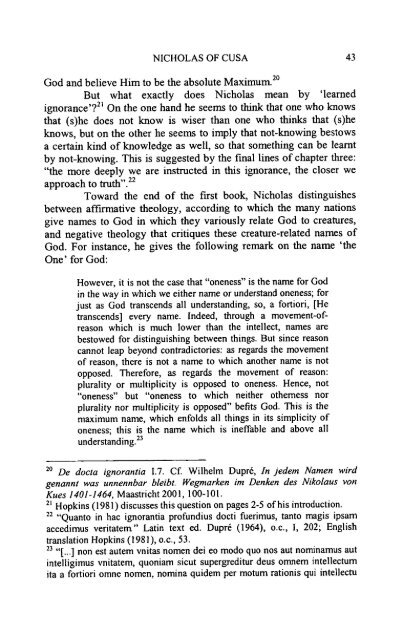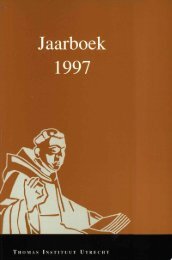Jaarboek Thomas Instituut 2006 - Thomas Instituut te Utrecht
Jaarboek Thomas Instituut 2006 - Thomas Instituut te Utrecht
Jaarboek Thomas Instituut 2006 - Thomas Instituut te Utrecht
Create successful ePaper yourself
Turn your PDF publications into a flip-book with our unique Google optimized e-Paper software.
NICHOLAS OF CUSA 43<br />
God and believe Him to be the absolu<strong>te</strong> Maximum.20<br />
But what exactly does Nicholas mean by 'learned<br />
ignorance'?" On the one hand he seems to think that one who knows<br />
that (s)he does not know is wiser than one who thinks that (s)he<br />
knows, but on the other he seems to imply that not-knowing bestows<br />
a certain kind of knowledge as well, so that something can be learnt<br />
by not-knowing. This is sugges<strong>te</strong>d by the final lines of chap<strong>te</strong>r three:<br />
"the more deeply we are instruc<strong>te</strong>d in this ignorance, the closer we<br />
approach to truth".22<br />
Toward the end of the first book, Nicholas distinguishes<br />
between affirmative theology, according to which the many nations<br />
give names to God in which they variously rela<strong>te</strong> God to creatures,<br />
and negative theology that critiques these creature-rela<strong>te</strong>d names of<br />
God. For instance, he gives the following remark on the name 'the<br />
One' for God:<br />
However, it is not the case that "oneness" is the name for God<br />
in the way in which we either name or understand oneness; for<br />
just as God transcends all understanding, so, a fortiori, [He<br />
transcends] every name. Indeed, through a movement-ofreason<br />
which is much lower than the in<strong>te</strong>llect, names are<br />
bestowed for distinguishing between things. But since reason<br />
cannot leap beyond contradictories: as regards the movement<br />
of reason, there is not a name to which another name is not<br />
opposed. Therefore, as regards the movement of reason:<br />
plurality or multiplicity is opposed to oneness. Hence, not<br />
"oneness" but "oneness to which neither otherness nor<br />
plurality nor multiplicity is opposed" befits God. This is the<br />
maximum name, which enfolds all things in its simplicity of<br />
oneness; this is the name which is ineffable and above all<br />
understanding.P<br />
20 De docta ignorantia I.7. Cf. Wilhelm Dupré, In jedem Namen wird<br />
genannt was unnennbar bleibt. Wegmarken im Denken des Nikolaus von<br />
Kues 1401-1464,Maastricht2001, 100-101.<br />
21 Hopkins (1981) discusses this question on pages 2-5 of his introduction.<br />
22 "Quan<strong>te</strong> in hac ignorantia profundius docti fuerimus, tanto magis ipsam<br />
accedimus verita<strong>te</strong>m" Latin <strong>te</strong>xt ed. Dupré (1964), o.c., I, 202; English<br />
translation Hopkins (1981), o.c., 53.<br />
23 "[ ... ] non est au<strong>te</strong>m vnitas nomen dei eo modo quo nos aut nominamus aut<br />
in<strong>te</strong>lligimus vnita<strong>te</strong>m, quoniam sicut supergreditur deus ornnem in<strong>te</strong>llectum<br />
ita a fortiori omne nomen, nomina quidem per motum rationis qui in<strong>te</strong>llectu








